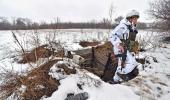India is committed to rules-based international order, the United States said Wednesday, hoping that New Delhi would stand by its side in case of an impending Russian invasion of Ukraine.

During the recently concluded Quad ministerial in Melbourne that included foreign ministers from Australia, India, Japan and the United States, State Department Spokesperson Ned Price said there was a discussion of Russia and Ukraine.
"There was a strong consensus in that meeting that there needs to be a diplomatic -- a peaceful resolution to this. One of the core tenants of the Quad is to reinforce the rules based on international order," he said.
"And that is a rules-based order that applies equally in the Indo-Pacific as it does in Europe as it does anywhere else. We know that our Indian partners are committed to that rules-based international order. There are any number of tenets in that order. One of them is that borders cannot be redrawn by force," Price said in response to a question.
"That large countries cannot bully small countries. That only the people of a particular country can be in a position to choose their foreign policy, their partnerships, their alliances, their associations. Those are principles that apply equally in the Indo-Pacific as they do in Europe," he said in an apparent reference to the aggressive behaviour by China against its neighbours including India.
Price said Secretary of State, Tony Blinken, and External Affairs Minister S Jaishankar discussed defense issues, but refrained from commenting if there was any discussion on potential actions under the Countering America's Adversaries Through Sanctions Act (CAATSA).
"There was a discussion of our broad defense relationship, but I wouldn't want to characterize it beyond that," Price said.
Earlier in the day, Secretary of State Tony Blinken said that the US is doing everything it possibly can to seek a peaceful resolution to the crisis Moscow has "needlessly precipitated".
"But those efforts, as we've said, will be effective only if the Russian Federation is willing to de-escalate," Price told reporters.
"To be very, very clear, we have not seen that. In fact, we have seen the opposite in recent weeks and even in recent days. More Russian forces, not fewer, are at the border and they are moving concerningly into fighting positions. This is cause for profound concern. At the same time, and as we've warned previously, over the past several weeks we've also seen Russian officials and Russian media plant numerous stories in the press," he said.
The state department spokesperson alleged that any one of these could be elevated to serve as a pretext for an invasion.
"This could happen, we are concerned, at any time and the world should be ready for it. It could involve claims about Ukrainian military activity in the Donbas, false claims of US or NATO activities on land at sea or air, even claims of Ukrainian or NATO incursions into Russian territory," he said.
"We are particularly concerned about President (Vladimir) Putin and other Russian officials, their ongoing mentions of 'genocide' in Donbas. There is no basis of truth to any of these allegations.
"This, however, has not stopped the Russians from advancing these false claims to include reports of unmarked mass graves of civilians allegedly killed by Ukrainian armed forces and statements that the United States or Ukraine are developing biological or chemical weapons, the latter for use in the Russian controlled territories," he said.
The Kremlin has repeatedly denied it has plans to attack Ukraine but demanded that NATO never admit Ukraine and other ex-Soviet nations as members and the military alliance roll back troop deployments in former Soviet bloc nations.











 © 2025
© 2025